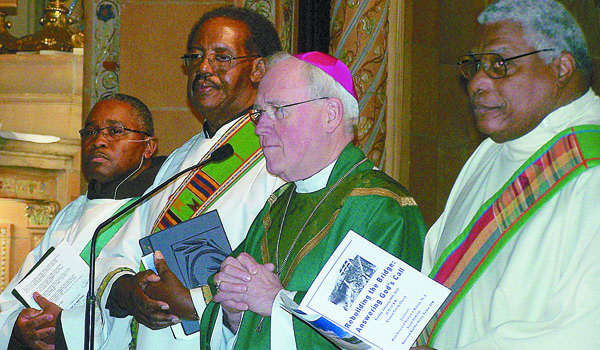'Are we there yet?' homilist asks at MLK Mass
by PATRICK J. BUECHI
How far has society come to ending racism 50 years after the Civil Rights marches from Selma to Montgomery Ala.? That question was posed to the congregation gathered at Blessed Trinity Parish for a special Martin Luther King Mass on Jan. 18.
Guest homilist Reverend Brother Henry Fulmer, OFM, from the Diocese of Charleston, S.C., has the rare distinction of being both a Franciscan friar and a permanent deacon. He asked the congregation the oft-heard question, "Are we there yet?"
"We are not there yet if we look at television and see what happens in Ferguson. We're not there yet, just coming back from Israel and learning something about Palestine and the Israelites. They're not there yet," he said.
Newspaper headlines detailing the shooting of a black teen by a white police officer in Ferguson, Mo., sparked riots and civil unrest, just had white on black violence led to the Los Angeles riots of 1992 and the riots following Dr. King's death in 1968.
"There are people in our world and in our society that are oppressed even today. And there are many of us who think that they have made it," Brother Henry said. "They think that because we have a degree, we have made it. They think that because we sit on boards, we have made it. We think we hold a position, a job, we have made it. But, my question is, are we there yet? I think the dream has fallen asleep a little bit. And I believe it's thing like Ferguson and things that happen in Palestine and Israel and Africa, when we see injustice, does it always have to come to that?"
The Gospel readings for that day feature Eli being punished for not challenging his sons after something they did to God.
"For many of us, when we keep our mouths closed when injustice happens in our neighborhoods, in our states, and in these United States, then we are just as guilty as those that perpetrate that action," Brother Henry said. "We should not wait until things happen in Ferguson. We should not wait until things happen in New York. Our hearts must always be open to doing that which is right."
Often, Brother Henry said, people will not point out the faults in others, for fear that their own faults will be brought to light, but in keeping others accountable for their actions, they help themselves and all of society.
He also encouraged parents to tell their children of about the racism and prejudice they have faced, as those who fail to learn from the past are doomed to repeat it.
"Dr. King taught that only love can overcome hatred, bitterness and fear. May the struggle for social transformation continue in this generation. May all people come to believe that with perseverance, we shall overcome," he said. "Are we there yet? In order to get there, my brothers and sisters, it starts with each and every one of you."
Bishop Richard J. Malone, main celebrant for the Mass, encouraged all to look inside themselves and examine an prejudice that may linger in their hearts.
"It's good to remember that while the big dramatic incidences of racial inequality and racial injustice make the newspapers and the television, and we agonize over that when we see it, there can be quieter, more insidious traces of that kind of prejudice lurking I people's hearts and our hearts that we don't even recognize," he said.




